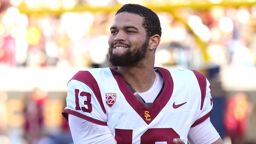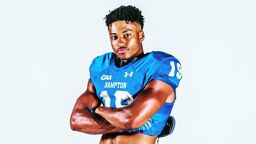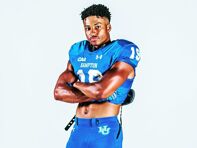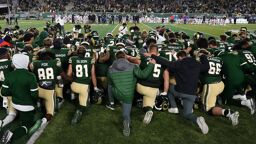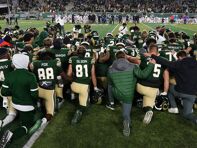It was the end of an excellent profile of openly gay college football player Jake Bain in the New York Times that really struck me as to the power of coming out and being visible.
In April, [Bain] received a message from a closeted Irish teenager who described the relentless bullying he experienced at his Catholic all-boys school. “I just admire your bravery and I need someone to guide me on what to do,” the boy wrote.
Jake offered some advice and months later, he received a new message: “Jake, one week ago I came out to my family,” wrote the boy, who explained that he had shared Jake’s story with his religious parents, which ultimately helped them accept him for who he is.
“Thank you so much,” the boy wrote. “You were the reason I decided to come out.”
The story by Dan Levin was unusual in that in ran in Sunday’s National news section, not the sports page, with the focus being on how Bain, 19, now a freshman on Indiana State’s football team, went to being an “accidental activist” after his coming out became public.
His life, as it unfolds on the football field and before nearly 13,500 Instagram followers, has inspired many others to come out, their own stories often left in comments on his page. It also has been the focus of taunts and protests, as recently as this month. But Jake’s narrative, at turns harrowing and triumphant, is playing out in heartland towns and conservative state universities across the country, as gay and transgender teenagers emboldened by the power of social media are stepping into the limelight and demanding acceptance and equality.
Coming out as LGBT in sports is powerful because it can shatter so many stereotypes, especially in a sport like football. That’s one reason why Bain’s story resonated, with added fuel from the power of social media. Another reason is that while he shies away from the activist label, as he said in an August Outsports profile, he realizes he is now in a position to help others who are going through the same things he did.
“When the kid from Ireland reached out to me and told me his story, I was so moved to hear that I was able to give him the courage to come out and be himself,” Bain told me in a text exchange.
“Any time I hear someone else’s story of coming out, I can’t help but put myself in their shoes, and think back to when I was starting to come out, and how much I would have loved to have someone to give me advice and help me through the process. Now I always try to be that person for others to look up to and get advice from if they ever need it.”
Athletes like Bain realize they don’t have to give speeches to be heard. Simply living their life openly and playing the sport they love can be powerful and inspiring, especially for people in their peer group.
Bain is aided in his ability to make a difference by his boyfriend, Hunter Sigmund, a swimmer at the same St. Louis high school who now attends the University of North Carolina. Having a happy, young gay couple in love pursuing their dreams is powerful stuff. Our story on them going to the senior prom is the third-most read story on Outsports in 2018, for example, racking up 954,000 engagements on our Twitter feed

Sigmund told his coming out story in September and he was also inundated with messages from people who were able to relate to his challenges.
“I got a bunch of messages from LGBT youth as well as adults who told me about their past struggles,” Sigmund told me via text. “The LGBT youth who reached out mostly asked me about how to find the courage and strength to come out to their parents. I got messages from people in Iceland, New Zealand and all over the U.S.
“A lot of the kids who contacted me who had a lot of trouble with their parents and families and wanted to know how to find the courage to tell them.”
Sigmund is very aware that visibility is important for LGBT people.
“When LGBT youth see someone who they can relate to who has come out, they feel a desire to be themselves because they see that young people can be openly gay and be extremely happy.”
Bain will continue to be visible and make difference for years to come.
Division I Indiana State went 7-4 in his freshman year (a year after going winless) and Bain played so sparingly that he has four years of eligibility remaining. He still has a lot of “accidental activism” left to do.
Jake Bain can be followed on Instagram or Twitter. Hunter Sigmund can be reached via email at [email protected] or on Instagram at @hunter.sigmund.


